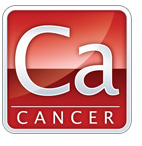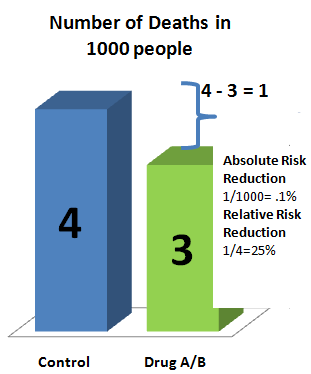Mumford | Tue January 11, 2011
they are so tricky. nice catch.

January 09 2011
Cancer and other cardiovascular diseases are pretty common these days . Usually the chance/risk of you getting /preventing/ treating cancer/other diseases is usually expressed in percentages since we are not certain about their outcome.

But sometimes these percentages can be deceiving.
Which drug will you take? Obviously, Drug A.
In fact, it doesn’t matter which drug you take: The risk reduction of 25% and 0.1% ,though looks different, is in fact the the same for both the drugs
It is because the percentages are just expressed differently as in absolute vs relative risk. Risk or chances of you getting/preventing/treating a disease is usually expressed in absolute or relative risk. The risk always appear bigger when expressed in relative risk than absolute risk as you can see.
For example, consider 1000 women who did not take the drug A/ B and another who did take. Within 10 years, 4 die in the first group an 3 in the second group which did take the drug of cancer as shown in the picture. You can see how we got the absolute and relative risk reduction.

Anoop | Tue January 11, 2011
Thanks Mumford. I think these sort of information is really important for people to know.
There are studies which show even doctors chose to use treatments when it was expressed in relative risks and not when it was expressed in absolute risks.
FullDeplex | Wed January 12, 2011
This article comes at a bad time for me. Just heard that my training partner has the big C.
Good info though.
Anoop | Mon January 17, 2011
Sorry to hear about your friend. I know how it feels to have someone close to you have cancer.
just make sure he triple check it. Too many false positives in tests these days.
Interesting subject - absolute vs relative risk.
Any idea whether the following is an Absolute or relative risk?
What if there was a miracle pill that if you took it each day would give you a 20% less chance of getting breast cancer, a 30% less chance of getting heart disease, a 50% less chance of diabetes, and would help you live longer and healthier into old age.
The miracle cure:strap on your walking shoes for an hour a day and you will reap all of these health benefits, according to recent health studies published in major medical journals.
Anoop | Wed March 09, 2011
Hi Ikke,
Thank you for posting.
If it is a product or a drug, it is usually expressed in relative risk.Do you have a link to the product?
© 2008 - 2024 | Exercise Biology. All rights reserved.